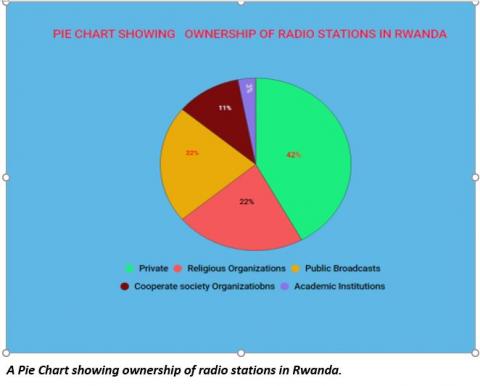STATE-OWNED MEDIA CONTINUES TO DOMINATE IN RWANDA
 Submitted by jbimokola on
Submitted by jbimokola on

Full multimedia story on https://ojarainnocent.wordpress.com/2018/06/22/government-owned-media-outlets-continue-to-dominate-in-rwanda/
Rwanda has opened up its media industry to private ownership, but concerns remain on the predominance of the government-controlled media. This is raising concern from journalists and other organizations on the level of press freedoms in such an environment. Innocent Ojara looks at the media ownership in Rwanda and its impact on media freedoms.
Despite the fact that the media in Rwanda in mostly private owned, the state-owned platforms reach greater country coverage of 98% against 60% of private media impact.
In the 1930, Hobe and Kinyamateka newspapers by the Catholic Church were the first media in Rwanda way before the occurrence of the 1994 Rwandan Genocide.
Ever since, Rwanda’s media landscape has changed dramatically and the country has seen tremendous social and economic changes, this has led to establishment of various television networks, newspapers and radio stations under different ownership patterns.
The face of media landscape in Rwanda has been evolving since 2002 liberalization that allowed private media ownership, we have since then seen multiple media outlets emerging contributing to widening of space for freedom of expression. The liberalization formalized the operations of private media and how they would be regulated.
According to Rwanda Governance Board (RGB) report on The Status of Media Houses in Rwanda 2016, there are 32 weekly newspapers and magazines, 27 electronic media outlets and one television station, officially approved by the Media High Council (MHC).
Most media houses in Rwanda are owned by private people and they are highly concentrated in Kigali. These forms of media serve the Rwandan community by disseminating necessary information among the general public.
However, Albert Rudatsimburwa, Contact FM owner and founder in Rwanda, claimed that most of the private media outlets that rapidly evolved in Rwanda’s media after the 2002 liberalization were majorly active in the entertainment than pure journalism.
“I would say the line that most of the private media outlets took is to give more weight to entertainment than pure journalism so again the government was still leading when it came to newscast and storytelling,” he said.
Media ownership in Rwanda is pluralistic marked by a variety of outlets with diverse ownership. Pluralism embraces a number of aspects, such as diversity of ownership, variety in the sources of information and in the range of contents available in the country.
However, according the Rwanda Media Commission, a media regulatory body in Rwanda, in a report on the State of Media Freedom in Rwanda 2015, for many analysts or observers, media pluralism has come to mean, almost exclusively, plurality of ownership.
Media ownership in Rwanda range from state ownership, and by private, religious, other groups and academic Institutions.
Media ownership however influences the way media messages are reported in Rwanda, in terms who should report what and where and when, for instance, According to Rwanda Media Barometer report on the state of media freedom in Rwanda 2016, the majority of media practitioners who were interviewed do not think public and private media enjoy equal treatment in terms of access to information.
State-owned media maintain the largest audience, and most private outlets do not cover controversial topics, although privately owned radio stations occasionally criticize government policies.
According to Barometer Report 2016, the majority of media practitioners who were interviewed do not think public and private media enjoy equal treatment in terms of access to information. This discrimination is mostly done by those holding public offices at the central government level, police officers and local authorities.
The New Times is the largest English-language and the oldest in Rwanda. It also owns a newspaper joint in the local language Kinyarwanda, called Izuba Rirashe. The newspaper has been criticized for being “too servile” to the ruling party of Rwanda.
The Rwandan television industry is mainly run by the state-owned Rwandan Broadcasting Agency under its subsidiary Rwanda Television. It provides daily news and entertainment for the Rwandan public in three languages: English, Rwandan and Kinyarwanda.
Attempts to speak to both the Rwanda Media High Council, as well as the Rwanda Ambassador to Uganda on media ownership were futile by press time.
- 2199 reads
